#zhōu
Text

Fangs gown in CQ:TMU! The textures are like her train robbery dress as the train robbery takes place later and is like a reminder for Minerva of when they first met.
This was another idea because I didn’t like that she basically only had her necklace and earrings that were silver and nothing else, I thought her dress felt empty but I kinda like it how it is now. This one felt way too fancy and cluttered for the party lol

#Zhōu Fang#cosy quarters: the midnight underground#digital drawing#oc#digital art#digital sketch#original character#digital doodle#cosy quarters#artists on tumblr#queer artist#character design#non binary artist#red#outfit design
19 notes
·
View notes
Note
I know IK isnt an outstanding cook or anything, but the part where everyone said her food tasted like home made me feel fuzzy inside :DD
So it had me thinking: What are the brothers favorite human dishes of IK's?? If she has a variety that is ^^'
I read a fic once where the chefs intent kind of bled into the food like magic and made the dish taste different depending on that, and imagining IK making a meal while furiously being like "you WILL like this food because i am MAKING IT FOR YOU and I LOVE you and you will enjoy it SO MUCH and be full and HAPPY and CONTENT OR SO HELP ME GOD" is actually cracking me up so bad. she just wants everyone to have a nice filling dinner before bed
They take a bite and are like "Tastes like love and ...... fury ??"
ik has a pretty big repertoire of dishes! though most of it's a mix-and-match of similar base elements (rice/noodles + various fried vegetables, stewed/steamed pork ribs, etc.)
as for favourite dishes... lucifer's is the dumpling soup she made back during the retreat (called húntun in mandarin, but i think the more popular western name for it is wonton?), because it's the first time ik cooked for them and he's sappy like that
belphie is SUPER boring and likes plain old zhōu (it's kind of like a rice porridge) - because it's fast and easy to make, and easy to eat. ik knows a bunch of little ways to 'accessorise' it to add some extra flavour and she's gotten really good at discerning what belphie might want based on his mood
mammon and levi both like eggdrop soup! not necessarily just because of taste, because it varies (ik tends to just use whatever leftover meat and veg is available) - levi likes stirring it around and making the egg pieces 'swim' around like fish, and mammon likes identifying all the individual ingredients like he's panning for gold
beel likes just about everything, but his particular favourites are anything with pork ribs. also one time ik had a go at yóutiáo (popular street food that her dad ate a lot of as a uni student), and he loves that you can go either sweet or savoury with them. also he just likes fried things
and satan and asmo both like bāozi, but satan prefers the savoury kind (he especially likes those shanghai-style fried ones becuase he enjoys the crunch), and asmo prefers the sweet kind (bean paste, lotus seed). satan likes that they're easy to eat while reading, asmo likes when ik decorates them with sesame seeds
#answering asks#whensam#i know zhōu is called congee in english but i dislike that word heavily#can't explain why i just do#also woah i had more to say on the subject than i thought#this is all stuff her dad's taught her how to make (or else stuff she's learnt by extrapolating what her dad's taught her)#also i think lucifer and belphie would like tanghulu and satan would like tangyuan#ik doesn't know how to make those ones on her own but her dad does#ik teaches everyone how to make dumplings and they all sit around the kitchen table to make them together#lucifer satan and mammon are on dough-rolling duty and everyone else is in charge of wrapping the dumplings#lucifer is scarily fast and efficient#satan produces the most perfect circles you've ever seen#mammon's just having fun
11 notes
·
View notes
Text

miren, un panda rojo
18 notes
·
View notes
Text
[Traditional Chinese Festival] Customs of 臘八節(Laba Festival) in China.Eng Sub
Today(January 18, 2024) is the traditional Chinese festival,臘八節 Laba Festival.Let’s learn about some interesting traditions and customs about this festival.
【About 臘八節(Laba Festival)】
Laba Festival (Chinese:臘八節) is a traditional Chinese holiday celebrated on the eighth day of the month of La (or Layue 臘月), the twelfth month of the Chinese calendar. It is the beginning of the Chinese New Year period. It is customary on this day to eat Laba congee.
Laba Festival was not on a fixed day until the Southern and Northern dynasties, when it was influenced by Buddhism and was fixed on the eighth day of twelfth month, which was also the enlightenment day of the Buddha. Therefore, many customs of the Laba Festival are related to Buddhism.
The Laba Festival's name represents its date on the Chinese calendar. La is the name of the twelfth and final month, and ba means "eight/八". In ancient China, the "eight/八" referred to making sacrifices to eight gods at the end of the year.
In its original form, the festival was celebrated by making sacrifices to gods and ancestors to wish for good fortune, health, safety, and a good harvest in the new year. The word la originally referred to these sacrifices.
After Buddhism spread to China during the first century CE, the festival was used as commemoration of Gautama Buddha's enlightenment.It was given a fixed date (the eighth day of the twelfth month) during the Northern and Southern dynasties.
【Customs of 臘八節/Laba Festival?】
Laba congee/臘八粥
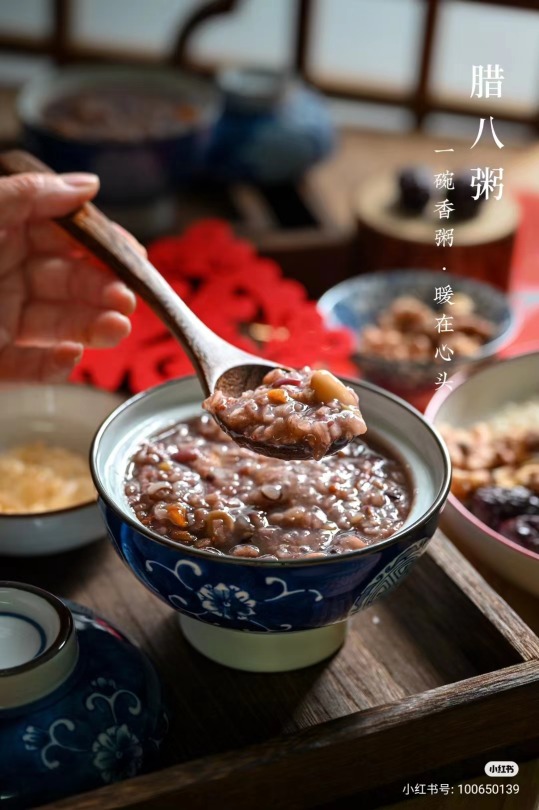
Traditionally, the consumption of Laba congee is an important element of the festival. There are multiple legendary accounts of the dish's origins. One story says that it originated in the Song dynasty with Buddhist monasteries giving congee to people in honor of the story that Sakyamuni (Gautama Buddha) reached enlightenment on the eighth day of the twelfth month after eating congee.
Laba congee or Laba porridge (臘八粥; Làbāzhōu) is very popular in many places in China. Different kinds of rice, beans, nuts and dried fruits are the main ingredients. People believe that it's good for health in the winter.
It is also known as "eight-treasure congee" (八宝粥; Bā bǎo zhōu)and is usually made with eight or more ingredients, representing good luck. Eight is a lucky number in China, and the ba in Laba also means eight.
There are many variations of Laba congee in different regions of China. Ingredients can include mixed grains, such as rice, millet, and barley; beans and nuts such as mung beans, azuki beans, lotus seeds, peanuts, walnuts, and chestnuts; dried fruit such as red dates, longan, raisins, and goji berries; and other ingredients such as vegetables and meat.
2.Laba garlic/臘八蒜
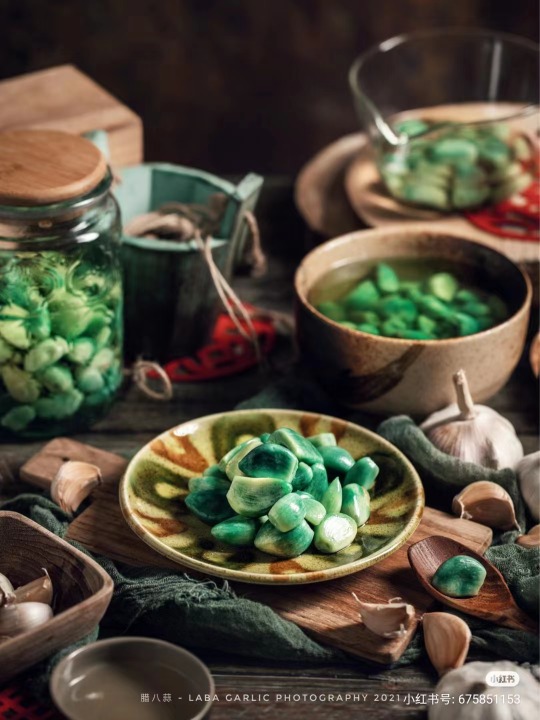
Another Laba food is Laba garlic, which is particularly popular in northern China.Garlic in Chinese (蒜; suàn) has the same pronunciation as calculate (算; suàn), and it is said that on the Laba Festival businesses should balance their books and calculate their revenues and expenditures for the year.Laba garlic is made by soaking garlic in vinegar. Laba garlic is soaked in vinegar from the Laba Festival until Chinese New Year. The garlic and vinegar are then used alongside Chinese dumplings (jiaozi) around Chinese New Year.
————————
🧚🏻Model/Makeup:@曾嚼子&@兔狲猫眠眠
📸 Photo:@逸群闲余
🔗 Xiaohongshu:http://xhslink.com/zlF8Hz
————————
#chinese hanfu#hanfu#Traditional Chinese Festival#臘八節 Laba Festival#chinese culture#chinese customs#chinese history#hanfu accessories#chinese food#china#chinese new year#song dynasty
200 notes
·
View notes
Text
stuff li aixue says
this is a quick compilation and translation of mandarin chinese segments in exordia, for reference purposes or just the discerning curious reader out there. quotes aren't limited to aixue, of course, but I wanted a catchy title.
I do have the memory of a single-celled organism and am not really skilled at combing through chapters for that one quote, so if I've missed something you're welcome to send it to me to be added.
spoilers ahead.
note: all mandarin chinese bits in Exordia are rendered solely in Hanyu Pinyin and not Hanzi, so I've done some guesswork for hanzi (in places where they're not immediately obvious) based on context.
Chaya's Protocol:
A woman in a red T-shirt trots right past her, headed toward the angel. She’s shooting video on her phone, chattering excitedly: “Jiào tā mén xiān yòng huā cài cauliflower hé xī lán huā tǒng pì yǎn bā, zhè cái suàn shì universality of fractal behavior de lì zǐ!”
=> 叫他们先用花菜 cauliflower 和西兰花捅屁眼吧, 这才算是 universality of fractal behavior 的例子!
ENG: right, tell them to shove some cauliflower and broccoli stalks up their ass then, that's a real example of the universality of fractal behavior!
note: ah, Aixue's memorable entrance. 捅 (lit. poke) 屁眼 (lit. butt) 吧 roughly means 'why don’t you stick it up your ass'. she's insulting the person she's talking about, presumably for saying something incorrect about universal fractality.
-
chapter 33:
Master Sergeant Zhang: Máo gān, zhè shì máo jiān. Wǒ mén xū yào jǐn jí kōng zhōng zhī yuán!
=> 矛杆、这是矛剑。我们需要紧急空中支援!
ENG: High Spear, this is Sharp Sword. We need urgent air support!
-
chapter 39:
Aixue: Wǒmen bìxū yào Pò fǔ chén zhōu… / Bù xíng! Wǒmen bìxū yào pò fǔ chén zhōu!
=> 我们必须要破釜沉舟... / 不行!我们必须要破釜沉舟
ENG: we need to fight to the very end... / no! we need to fight to the very end!
note: Aixue says 破釜沉舟, which is a four-word chengyu (idiom) that roughly means 'to pursue your last resort'; it literally means to sink one's entire fleet in an offensive, and figuratively refers to cutting off your own means of retreat i.e., to fight to the very death and leave yourself no choice.
-
and some trivia on other Chinese phrases:
lala (拉拉): Chinese slang for 'lesbian'. comes from lazi (拉子), from the novel Notes of a Crocodile by famous Taiwanese lesbian author Qiu Miaojin.
T / P: the Chinese counterpart to the butch/femme spectrum. T = tomboy, P = po ('wife') or also pretty girl, apparently.
tongzhi (同志): Huang Lim says this to Chaya. this is slang for homosexual in Chinese, but also means comrade (with historical communist associations), hence Huang Lim phrasing it as comrade first.
Li Aixue: aixue's name itself makes sense once you learn about her whole shtick with prajna, a fact that impresses me because Seth had already set her name into stone as early as the precursor short story for Exordia. just things that make you wonder if they'd planned everything out from the very beginning. anyway, Aixue sounds like 爱学, i.e., 'love for learning'. get it? there are many possible surnames with the hanyu pinyin Li, but my pet theory is that Li = 厉 (lit. 'powerful'), so that putting it all together into 厉爱学 means Aixue is an ultra nerd.
72 notes
·
View notes
Text
Breakfast foods in China
Since arriving in China my typical breakfast has changed quite a lot (hello baozi and mung bean paste!) so I decided to explore some common local breakfast foods eaten in China!
包子 - Bāozi (my love)
These have been an almost consistent (excluding the lunar new year when the canteens and most cafes and restaurants closed) staple of my breakfast ever since I arrived in China. They come with several fillings such as veggie, pork, seafood etc. and they can cooked in different ways such as being steamed, fried etc. Here's a more in-depth post about the types of dumplings and bāo.
粥 - Porridge (zhōu)
I sometimes have porridge for lunch instead and it's a really filling meal. I get the Century Egg Congee with Chicken - 皮蛋瘦肉粥 (Pídàn shòu ròu zhōu) and it's one of my all time favourite meals.
煎饼 - Egg pancake (jiānbing)
Popular also as a street food, this is a thin crepe type pancake with an egg, veggie, spice, sauce and sometimes meat filling. The actual filling varies as you can customize what veggies and spice level you'd like and whether or not you want meat.
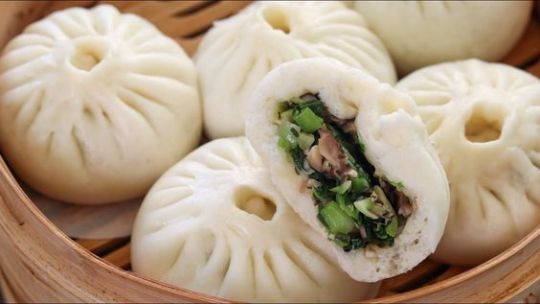
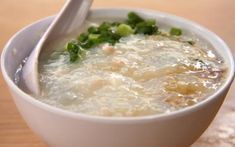

热干面 - Hot and dry noodles (règānmiàn)
I honestly had no idea about this dishes existence until a while ago, probably because it's a regional dish originating from Wuhan which is kind of far away from my location. These are spicy and dried noodles which are actually eaten without a broth unlike many other noodles. They seem pretty interesting so if anyone tried them before do share your experience!
桂林米粉 - Guilin Rice noodles (guìlín mĭfĕn)
This appears to be another regional dish from Guilin, Guanxi as I had no idea that this was a also a pretty popular breakfast dish. Apparently it's not the noodles but rather the broth that they're cooked in that makes them special, with the actual recepie varying across the region. Someone should do a long weekend trip vlog (pondering on this) to Guilin where they just go from store to store trying these noodles and trying to determine the differences.
葱油饼 - Scallion oil pancake (cōngyŏubĭng)
A tasty but heavy-ish pancake imo. These pancakes are cooked with scallions (green onion) and pan-fried to give it that crispy and chewy texture. Very tasty, but it's a little too heavy on the oil for me so I save these pancakes for special occasions instead.

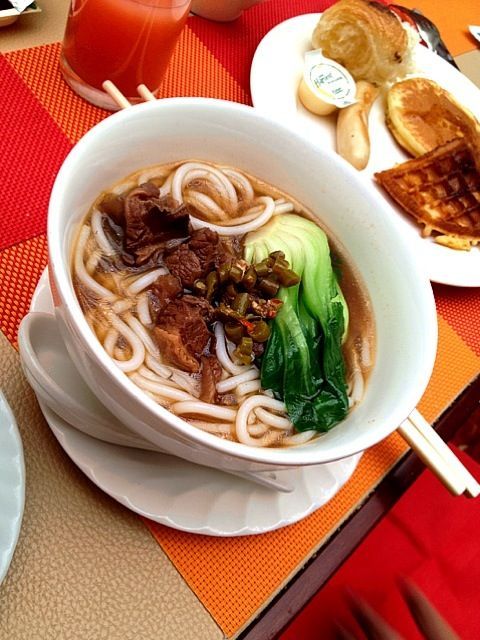
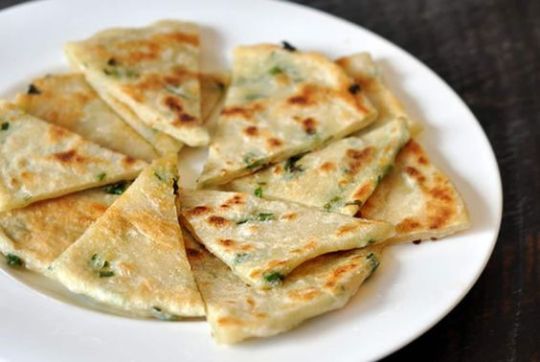
豆浆油条 - Soy milk and deep-fried dough sticks (dòujiāng yóutiáo)
I have tried the dough sticks, and I have tried soya milk but separately so far. The dough sticks are these long deep-friend dough sticks, reminding me slightly of breadsticks but more lighter and chewier.
茶鸡蛋 - Tea eggs (chájīdàn)
I adore these, my canteen serves them along with regular eggs for breakfast and the tea eggs are usually the first to go. They actually don't really involve tea, instead these eggs are cooked in a mixture of chinese five-spice powder (pepper, cloves, cinnamon, star anise and fennel seeds), soy sauce, and black tea leaves, although some recipes leave out the tea leaves.
They have a relatively strong smell so I usually grab some for breakfast on the weekends or in the canteen at lunch if there are any leftover after breakfast.
They are also quite cheap, one egg is around 2 yuan so around 0.30 euro, making them a pretty filling and affordable breakfast food.
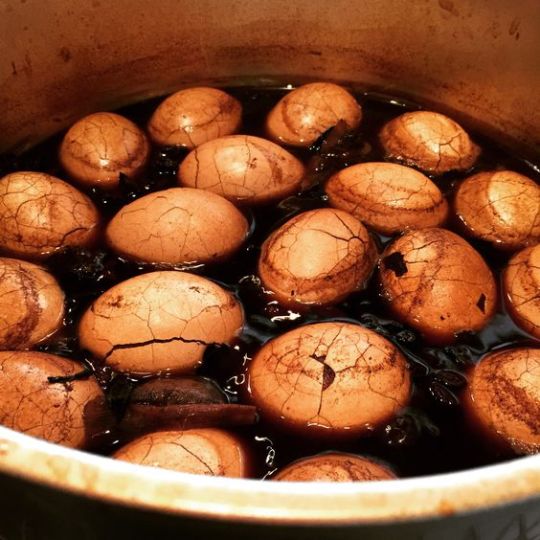
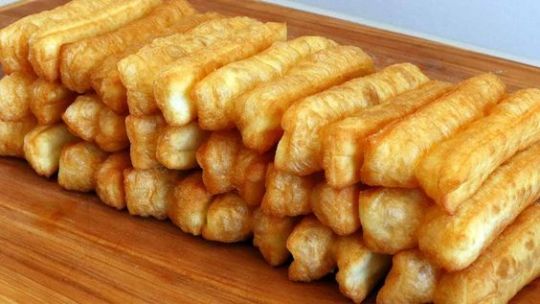
If there are any other common or specific breakfast foods that you know of, do share them please as I love trying out new things!
#chinese food#studyblr#college life#student life#study blog#life in china#aesthetic#student#study motivation#travel blog#china#study in china#college#slavic roots western mind#asia#chinese#asian food#baozi#cuisine#food#foodpics#dumplings#breakfast food#breakfast food in china#pancakes#tea eggs#porridge#congee#noodles#this is slowly turning into a food blod and im okay with it
95 notes
·
View notes
Text
Beauty Standards
新词:
美甲 / měi jiǎ / to have one's nail's done
指甲 / zhǐ jia / nail (e.g. fingernail)
这回 / zhè huí / this time (equivalent to 这次)
讲究 / jiǎng jiu / to be particular about; pay attention to
秀气 / xiù qi / delicate, fine (re: beauty, features)
一干二净 / yī gān èr jìng / entirely, completely (idiom); very clean
审美 / shěn měi / appreciation of beauty; taste
古代 / gǔ dài / ancient time period; olden days
时代 / shí dài / time period; era
当代 / dāng dài / current era, present time period
面霜 / miàn shuāng / face cream (cosmetic)
杨贵妃 / yáng guì fēi / name; one of the 4 ancient Chinese beauties
观念 / guān niàn / sense, concept, view
亚洲 / yà zhōu / Asia
身材 / shēn cái / figure (re: body)
重视 / zhòng shì / to put importance on smth (lit: heavy +vision)
气质 / qì zhì / aura of elegance/class
缺一不可 / quē yī bù kě / indispensable; one can't do without the other
评判 / píng pàn / to judge; judgment
单一 / dān yī / single, unitary, sole
小鲜肉 / xiǎo xiān ròu / young handsome guys (lit. "little fresh meat")
语法:
以A为B / taking A as B; using A as B
语法例子:
中国人以米饭为主食,而美国人以面包为主食。Chinese people take rice as their staple food, Americans take bread as their staple food.
我妈妈以我为骄傲。 My mom takes me as her pride.
句子:
中国人讲究以百净为美,就是皮肤白干干净净的,然后秀秀气气的那样。Chinese people are very particular about taking whiteness/cleanliness as being beautiful, so pale skin is clean, so it's delicate/fine.
我把老公的生日忘得一干二净!I completely forgot my husband's birthday!
不干不净吃了没病。It's not dirty, so eat it and you won't get sick (This is equivalent to the "3 second rule" when food falls on the ground)
每个民族不一样,它对审美的不一样。Every nationality/group is different, (so) their taste in beauty is different.
你说中国古代的时候讲究以胖为美。You know, in ancient China they thought fat was beautiful.
杨贵妃时代,那现在来说胖可不是美啦。(That was in) Yang Guifei's era, (but) nowadays there's no way fat is (seen as) beautiful.
中国古代的审美观念和现代的比了一下。The ancient China's sense of beauty and our present day's (sense of beauty) has changed a bit.
脸啊,气质啊,身材啊,也缺一不可。Face, elegance, body (figure), all are indispensable.
不是说单一的就是一个脸漂亮就行了。(If) we're not talking about a single (aspect), then a pretty face is enough.
对美女评判。The judgement of women (re: beauty).
在中国,那些特别受欢迎的男的叫小鲜肉啊。In China, those especially popular type of guy is called "little fresh meat".
在美国人看来那些小鲜肉看着就象十几岁的小孩似的。In America, people see these "little fresh meat" guys and think they look just like ten year olds (lit. ten years and some change).
#mandarin langblr#chinese langblr#language learning#mandarin chinese#chinese learning#mandarin#learning languages#yoyo chinese#langblr#chinese#yoyo#vocab#100
223 notes
·
View notes
Text
i finally have names for the dark hand!
Valmont Monette (i liked how stupid but also posh it sounds. Monette roughly means home or rich protection
Yamaguchi Tohru (Yamaguchi being 山口, meaning mountain entrance and Tohru being 竜, meaning dragon, imperial, mythical creature)
Phineas "Finn" Flanagon (i just liked how it sounded, but Phineas possibly means serpent's mouth in hebrew or Nubian from an egyptian name and Flanagon means descendant of Flannagán, which itself means blood red)
Andrea Giuseppe "Ratso" Santoro (huge thanks for my italian friend for just handing me this name wholesale. Andrea from Andrew which basically just means masculine, Giuseppe for Joseph, which means he will add, and Santoro meaning all saint's day)
Alonzo Chow (Alonzo meaning noble and ready. His chinese name is Kěguì, spelled 可贵 and meaning to be treasured or praiseworthy with Chow spelled 周 which is both a dynasty (Zhōu) and means to encircle)
Bonus:
Chow's little sister is Amanda, meaning loveable or worthy of love with her chinese name being Kěài, spelled 可愛 and meaning worth loving
#jackie chan adventures#valmont#finn#ratso#chow#tohru#jca finn#jca chow#jca valmont#jca ratso#jca tohru#jca headcanons#the dark hand#dark hand polyam#jca oc#because technically while amanda is implied. she is not named or seen#seriously thank you to my friend#i love ratsos name so much#also thanks to her i know ratso is from south italy
16 notes
·
View notes
Text
Vocabulary List #58
夕 [xī] - evening
名 [míng] - name
千 [qiān] - a thousand
舌 [shé] - tongue
不 [bù] - no; not
的 [de] - belonging to
大 [dà] - big
又 [yòu] - again
粥 [zhōu] - congee
茶 [chá] - tea
橙子 [chéngzi] - orange (the fruit)
子 [zi] - child; noun suffix
了 [le] - completed action marker
错了 [cuòle] - wrong
对了 [duìle] - correct; oh, by the way...
土 [tŭ] - earth; dust
#langblr#language#languages#chinese#chinese langblr#learn chinese#learning chinese#vocabulary list#vocab list#chinese vocab list#memrise
53 notes
·
View notes
Text

Drawing of Minerva and Fang in CQ:TMU
#Minerva Barlow#Zhōu Fang#cosy quarters: the midnight underground#digital drawing#oc#digital art#digital sketch#original character#digital doodle#cosy quarters#artists on tumblr#queer artist#character design#procreate
15 notes
·
View notes
Text
(到蘇州)賣鹹鴨蛋
🇭🇰🇲🇴 (dou³ Sou¹ Zau¹) maai⁶ haam⁴ aap³ daan²
🀄 (ㄉㄠˋ ㄙㄨ ㄓㄡ) ㄇㄞˋ ㄒㄧㄢˊ ㄧㄚ ㄉㄢˋ
🀄 (dào Sū Zhōu) mài xián yā dàn
Literal meaning: Heading to Suzhou to sell salted duck eggs.
Meaning: Euphemism for saying someone has passed away.
The full saying is 「到蘇州賣鹹鴨蛋」 but in practical use, people usually omit the 「到蘇州」 (sometimes even the 「鹹」) part.
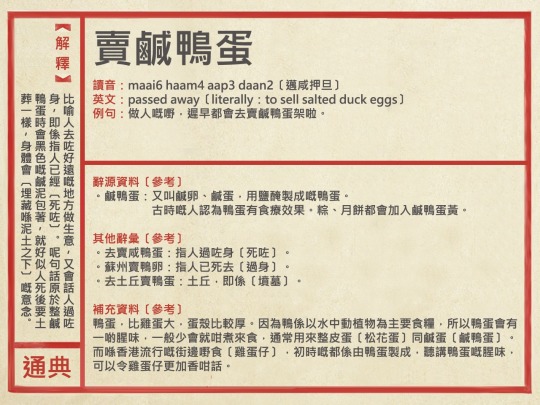
Saw this post by @malaidarling and it occurred to me that while I'd heard, and know the meaning of the expression, I'd never thought about its origins before…so I decided to look more into it and found three possible explanations. ↓
來源解說 (origins explained)
1. Part of the Minnan custom, not sure if it's still practiced but, Minnan people in the past apparently bury their dead along with a small rock and a salted duck egg.
The idea was when it came time to say final goodbyes, living relatives will tell the deceased that “they will meet again when the rock has turned to ash and a duckling has hatched from the egg”, indirectly meaning the deceased should put all cares aside and leave the world in peace. Because rationally, the rock will not turn to ash for eons, and a duckling will not hatch from a cooked and preserved egg.
So there's this further idea that the dead will be “selling their eggs in the Underworld”, hence, “selling salted duck eggs” = dead.
2. Still part of the Minnan custom, after prayers at their ancestors' graves, some Minnan descendants will scatter duck egg shells on the grave mounds. Why? Not known (but it probably has a little to do with explanation No. 1 ↑ — like a symbolic gesture of reunification? ¯\_(ツ)_/¯).
Anyway, the act of doing this is known as 「土丘剝鴨蛋」, literally meaning, “Peeling duck eggs on a mound”. And the words for 「土丘」 (mound) and 「剝」 (peel) in the Minnan dialect, sound like the words for 「蘇州」 (Suzhou) and 「賣」 (sell) in Standard Mandarin.
3. A (rather funny!) story from supposedly the Qing Dynasty period, of a young man from Taiwan who told his mother he was heading to Suzhou to start a (salted) duck eggs business.
But this (unfilial! 😹) young man instead wound up marrying a rich girl and even changed his surname to marry into her family. So his mother back in Taiwan (after not hearing any news from her son for a long time) tried to look for him through a spirit medium at a temple.
The medium (depending if you believe in the powers of a medium or not) “could not locate” this son because he had changed his surname, so he told the mother, 「世間已無某某人」 — “this world no longer has this person”, leading his mother to believe he had died in Suzhou! Henceforth, to “head to Suzhou to sell (salted) duck eggs” became associated with someone passing away.
n.b.: Suzhou and Yangzhou were known for producing large quantities of preserved foods in the past (according to Wiki).
16 notes
·
View notes
Text
MORE SHIP CHILDREN
First ship child on the chopping board
yin yu x Quan Yizhen - (I can’t find their ship name for the life of me and I don't know how to make one)
Yin Jia (M) - Only child
Yǐn (‘to guide’),
Jiā (good, auspicious, beautiful), or (home, family)
Appearance: He tries really really hard to keep his hair neat but it's still very wavey and wild like Quan Yizhens. He has bright eyes and a spirited face like Yin Yu in his youth. (He also had a paper mask he made when he was younger)
Personality: He's a rather quiet person but when he’s around people he likes he tends to be protective as well as a ‘mom’ friend. He follows Yin Yu around when he works so tends to put everything in a very specific and straightforward way.
Beefleaf - (I have a few thoughts on this ship. BUT I'm going to ignore them for a hot minute)
He Zhou (NB) - only know child
hè ( to congratulate)
zhōu (boat, ship)
Appearance: Blue eyed angel, and by that I mean bright icy blue eyes. Dark raven hair like He Xuan. In fact they mostly look like He Xuan except the bright eyes they got from Shi Qingxuan.
Personality: Rather cold uninterested person. They don't really interact with anyone, He Xuan keeps them on a close leash. They also only change their sex whenever someone refers to them as a gender such as - someone says their a ‘he’ they’ll turn into a female just to make them mad.
#beefleaf#quan yizhen#yin yu#quanyin#nevermind I found it#he xuan#shi qingxuan#heaven official's blessing#tgcf
21 notes
·
View notes
Text






Zhōu Xīnyǔ
11 notes
·
View notes
Text
WangXian [忘羡] Lyrics
Singers : Wu En [Lan Wangji], Yu Xia [Wei Wuxian]
[Wei Wuxian]
飞 花 连 碧 风 流 忆 年 少
fēi huā lián bì fēng liú yì nián shào
Flowers drift through the jade-coloured sky, a memory of youth
姑 苏 又 泛 春 潮
gū sū yòu fàn chūn cháo
Gusu bathes in the spring glow once again
[Lan Wangji]
群 峰 隐 隐 云 深 处
qún fēng yǐn yǐn yún shēn chù
Mountain peaks are hidden behind clouds
延 绵 自 有 相 思 道
yán mián zì yǒu xiāng sī dào
White wisps paving a path for my longing
人 虽 去 冰 心 未 销
rén suī qù bīng xīn wèi xiāo
Of you gone,a frozen heart keeps hoping
[Wei Wuxian]
雨 过 枇 杷 俏
yǔ guò pí pá qiào
Loquats drenched after the rain
竹 篙 略 挑 随 手 抛 谁 接 着
zhú gāo lvè tiāo suí shǒu pāo shuí jiē zhe
Playfully passing around bamboo poles, who caught it?
个 中 酸 甜 日 后 都 付 一 笑
gè zhōng suān tián rì hòu dōu fù yí xiào
Now I look back at those bittersweet times with a smile
原 来
yuán lái
So-
原 来 陈 情 俱 是 旧 人
chén qíng jù shì jiù rén
This first love was all for you
[WangXian]
撩 动
liáo dòng
How can-
[Lan Wangji]
心 事 如 何 能 避 尘
xīn shì rú hé néng bì chén
These desires be avoided?
与 你
yǔ nǐ
With you -
一 曲 吹 彻 欢 同 恨
yì qǔ chuī chè huān tóng hèn
I play a song of joy and sorrow
千 帆 过 还 天 真
qiān fān guò hái tiān zhēn
Through a thousand storms, yet your innocence remains
道 说 随 便 意 气 何 逍 遥
dào shuō suí biàn yì qì hé xiāo yáo
The say you speak your mind casually
身 后 却 是 滔 滔
shēn hòu què shì tāo tāo
But resentment always followed you behind
[Wei Wuxian]
烟 水 迢 迢 共 轻 舟
yān shuǐ tiáo tiáo gòng qīng zhōu
A small boat sailing down a misty river
云 萍 灯 火 接 天 照
yún píng dēng huǒ jiē tiān zhào
As lights from burning Yunmeng illuminated the sky like the sun
忽 醒 来 不 是 他 宵
hū xǐng lái bú shì tā xiāo
Eyes opened , but it's not that night
[Lan Wangji]
尘 世 三 千 条
chén shì sān qiān tiáo
Three thousand rules of this mortal realm
不 及 半 坛 天 子 笑 谁 醉 倒
bù jí bàn tán tiān zǐ xiào shuí zuì dǎo
Can’t compare to half a jar of Emperor’s Smile, who is the drunk one now?
停 弦 忘 机 情 动 却 难 知 晓
tíng xián wàng jī qíng dòng què nán zhī xiǎo
The melody detatches from the world, but the stirring emotions are difficult to comprehend
[WangXian]
原 来
yuán lái
So -
[Lan Wangji]
再 逢 只 需 一 瞬
zài féng zhǐ xū yí shùn
Only a moment was needed for this reunion
[WangXian]
过 往
guò wǎng
The past..
[Wei Wuxian]
在 意 何 必 处 处 闻
zài yì hé bì chù chù wén
Why seek to keep it in your heart?
[WangXian]
与 你
yǔ nǐ
With you
-
[Lan Wangji]
话 尽 生 死 酒 尚 温
huà jìn shēng sǐ jiǔ shàng wēn
I could spend my life speaking to you over warm wine
[WangXian]
十 年 梦 未 觉 冷
shí nián mèng wèi jiào lěng
All these ten years, it no longer feels lonely
原 来
yuán lái
So-
[Wei Wuxian]
陈 情 俱 是 旧 人
chén qíng jù shì jiù rén
This first love was all for you
[WangXian]
撩 动
liáo dòng
How can -
[Lan Wangji]
心 事 如 何 能 避 尘
xīn shì rú hé néng bì chén
These desires be avoided?
[WangXian]
与 你
yǔ nǐ
With you-
[Wei Wuxian]
一 曲 吹 彻 欢 同 恨
yì qǔ chuī chè huān tóng hèn
I play a song of joy and sorrow
[WangXian]
千 帆 过 还 天 真
qiān fān guò hái tiān zhēn
Through a thousand storms, yet your inoccence remains
21 notes
·
View notes
Text
Thousand Autumns Audio Drama Ending Song 2 - Cao Mu Bu Xiu Lyrics & Translation
Thousand Autumns Audio Drama Season 2 Ending Theme Song
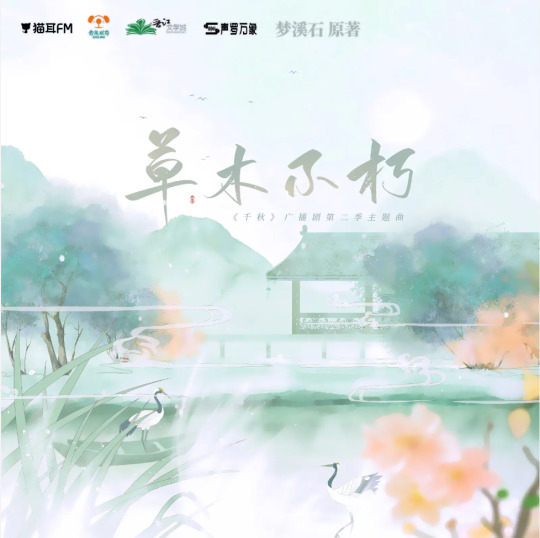
Production Team:
Produced by: Sheng Luo Wan Xiang Studio (声罗万象工作室)
Producer: Liao Liao (聊聊)
Lyricist: Zhen Zhu (镇朱)
Composer: Chen Yiming (陈亦洺)
Performed by: Chen Yiming (陈亦洺)
Arranger: Li Dabai (李大白)
Harmony writing/mixing: Cha Xue (茶雪)
Poster: Qin Mo (秦墨)
Inscription: Qiongjiu (穹九)
English Translation: Freiya, credit reference to TreasureChestSubs
----------------------------------------------------------------------------
The Grass and Trees Remain Eternal
Lyrics:
wǒ jièguò yī chuán mèng
我借过一船梦
suí mèng tiāndì xié yóu
随梦天地偕游
chéng wù zhī jí yǐ yǎn kāi jiǔzhōu
乘物之极以眼开九州
lěng yuè tài shòu biàn yǎng yú yī xiù
冷月太瘦便养于衣袖
mèng jiě lǎn yīgè wǒ dú xiàxíng zhōu
梦解缆一个我 独下行舟
tì zuórì shàonián
替昨日少年
zhē lái lù báihóng
遮来路白虹
bù wèn chūnshān jǐ dié xiàn yún zhōng
不问春山几叠陷云中
yǒuxīn yú wǒ jiàn shàng huà língluò
有心于我剑上画零落
yǔ nǐ xiāng zhuàng huà wàn qiān xīng fēng
与你相撞 化万千腥风
tòng xǐng hòu jìxù yuǎn zǒu
痛醒后继续远走
bù wèn sìhǎi quàn wǒ hé shí xiū
不问四海劝我何时休
cháng'ān lóu shàng yōng rénmíng liú
长安楼上庸人名留
rúcǐ dàdào wúyòng jiāng fēngyuè kè sòng
如此大道无用 将风月刻诵
wǒ jièguò yībēi jiǔ
我借过一杯酒
mǎn zhēn gǔlǎo xīngdǒu
满斟古老星斗
nǎge xiào céng ràng wǒ rù qíng zhǒng
哪个笑曾让我入情种
huò shì shānchuān dōu lái cǐ tíngliú
或是山川都来此停留
shì nǐ tà yè érguò zèng wǒ dāofēng
是你踏夜而过 赠我刀锋
huàn chī zhě jiěmèng
换痴者解梦
shēngsǐ qīng fèngsòng
生死轻奉送
bù wèn chūnshān jǐ dié xiàn yún zhōng
不问春山几叠陷云中
yǒuxīn yú wǒ jiàn shàng huà língluò
有心于我剑上画零落
yǔ nǐ xiāng zhuàng huà wàn qiān xīng fēng
与你相撞 化万千腥风
tòng xǐng hòu jìxù yuǎn zǒu
痛醒后继续远走
bù wèn sìhǎi quàn wǒ hé shí xiū
不问四海劝我何时休
cháng'ān lóu shàng yōng rénmíng liú
长安楼上庸人名留
rúcǐ dàdào wúyòng jiāng fēngyuè kè sòng
如此大道无用 将风月刻诵
bù wèn chūnshān jǐ dié xiàn yún zhōng
不问春山几叠陷云中
yǒuxīn yú wǒ jiàn shàng huà língluò
有心于我剑上画零落
yǔ nǐ xiāng zhuàng huà wàn qiān xīng fēng
与你相撞 化万千腥风
tòng xǐng hòu jìxù yuǎn zǒu
痛醒后继续远走
bù wèn tā nián tóng chén wàng yānbō
不问他年同尘忘烟波
duōshǎo gùshì zhuǎnshēn qiānqiū
多少故事转身千秋
xìng dé shì wài xū zhōu huì piāobó jiùyǒu
幸得世外虚舟 会漂泊旧友
tā xìn shānhé zhǎng yǒu
他信山河长有
cǎomù yì bùxiǔ
草木亦不朽
---------------------------------
English Translation
Once I borrowed a boatful of dreams,
and journeyed through the universe together with these dreams
Taking this opportunity with my own eyes to see the nine states[1]
Keeping the thin, cold moon within my sleeves.
The dream released one of me to descend the boat alone,
and helped the young man of yesterday
by covering up the way ahead in white moon light[2]
Do not inquire how many layers of spring mountains were wrapped in the clouds,[3]
If the will of my sword to paint the scattered pieces
turns into a thousand gusts of wind when clashing with you together
After being awakened from the pain, I'll continue to travel far away.
Do not ask the four seas to advise me when to rest,[4]
The mediocre man carves his name on the towers of Chang'an.
Thus the Great Way is but a worthless thoroughfare to carve the wind and the moon.[5]
Once I borrowed a cup of wine,
With the ancient stars, toasted a full cup.
Which smile has made me fall in love,
or made the mountains and rivers stay here?
You were the one who strolled through the night and handed me a blade,
For the sake of those with foolish dreams.
Life and death, gifted gently by you
Do not inquire how many layers of spring mountains were wrapped in the clouds,
If the will of my sword to paint the scattered pieces
turns into a thousand gusts of wind when clashing with you together
After being awakened from the pain, I'll continue to travel far away.
Do not ask the four seas to advise me when to rest
The mediocre man carves his name on the towers of Chang'an.
Thus the Great Way is but a worthless thoroughfare to carve the wind and the moon.
Do not ask him to forget the dust and the smoke in those years,
How many stories have been told in a thousand autumns?
Fortunate to drift with old friends in the ethereal boat.
He believes that the mountains and rivers will last forever,[6]
And the grass and trees will remain there eternally.[7]
--------------------------------------
*Translator's Notes:
[1]This line can also mean ‘riding to the extreme’ to see the nine states. Nine states also refer to the nine provinces in China, also part of the four seas.
[2]This line literally said “white rainbow”, but since there’s a cold moon mentioned before, I think this is actually a moonlight
[3]This line literally said ‘do not inquire’, but can also mean ‘no matter’.
[4]Four seas in this song mean the world/everywhere/all around the world
[5]For me personally I think these two lines described Yan Wushi. The whole reff described how passing through many outcomes and challenges, he had the idea of how human nature is evil, until he stumbled upon a pure mountain, a strong-stanced person (Shen Qiao) in which he began the change of his thinking (to the point of realizing how he was blinded and has been mistaken for a whole long while).
[6]The lyrics really is written as ‘he’
[7]In this line it was written literally as immortal/eternal
**The whole song is very complicated in my opinion, and some lines doesn’t really make sense if translated literally, hence I’m also open to suggestions/corrections.
--------------------------------
Navigation
Thousand Autumns Audio Drama Season 1 Ending Song: Wo Du San Qian Bian Ni by Xiao Hun
Translation Masterlist
#千秋#qianqiu#thousand autumns#yan wushi#shen qiao#yanshen#meng xi shi#text post#song lyrics#english translation#lyrics translation#audio drama#chinese novel
12 notes
·
View notes
Text
A rose xenogenic meets the Arbiter with sad eyes.
This is a fill for an anonymous prompt for the @danmei-action Gotcha for Gaza, requesting an An Zhe/Lu Feng role reversal with a happy/hopeful ending.
4 notes
·
View notes